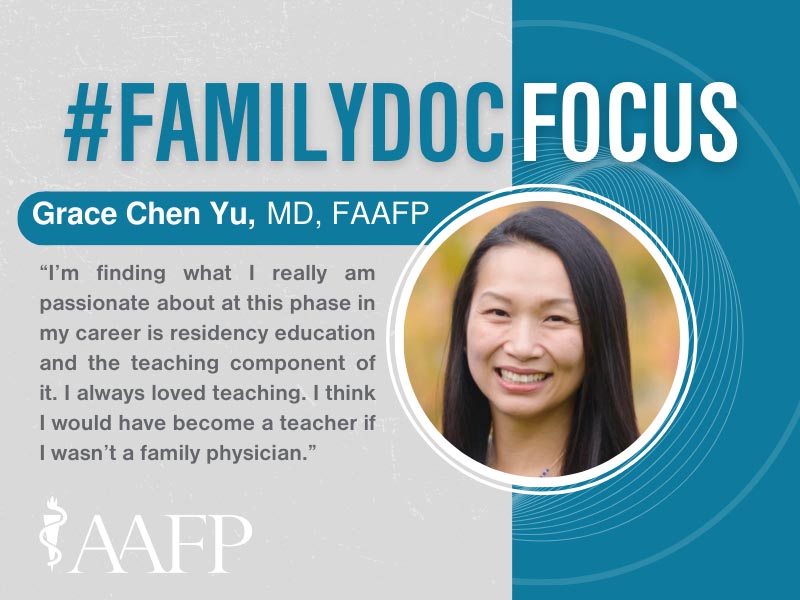Program Director Has Passion For Mentoring, Leadership
March 7, 2024, David Mitchell — Grace Chen Yu, M.D., FAAFP, didn’t attend the California AFP’s All Member Advocacy Meeting as a resident, nor did she participate in the annual event during her first decade in practice. But when she did go for the first time as the new program director of the Stanford-O’Connor Family Medicine Residency Program, the experience opened a door to state and national leadership opportunities.

“It was amazing, and I came back to work super excited,” said Yu, who has been the Stanford-O’Connor program director since 2016. “I also was thinking, ‘Why is there no local Santa Clara chapter of CAFP?’ So, I reached out to the leadership and staff and they said, ‘Oh, actually, that area has been pretty dormant, but we can support you and help you get it started again. And as long as you’re interested in that, would you also be interested in serving on the CAFP Board as the district representative for that area and a couple of other neighboring chapters?’ And that’s how I ended up becoming a director on the CAFP Board.”
Yu, who will complete her term this summer after serving since 2018, called it “a fantastic learning experience.”
“I’d never been on a board before,” said Yu, who also is a clinical associate professor in the Division of Primary Care and Population Health in the Stanford Health Care Department of Medicine. “I didn’t really know what the fiduciary responsibilities were. That was my first opportunity doing something professionally outside of my residency program, hospital or school.”
In 2021, Yu took on a national leadership role as an at-large Board member of the Association of Family Medicine Residency Directors.
“At that point, I felt like I actually knew what I was doing as a program director, and it would be really amazing to be able to be involved in some of the discussions facing family medicine education on the national level,” she said. “It’s been a huge learning opportunity, as well. I’m finding what I really am passionate about at this phase in my career is residency education and the teaching component of it. I always loved teaching. I think I would have become a teacher if I wasn’t a family physician.”
Yu encourages her residents to pursue leadership opportunities, too.
“I think so many people have an interest in leadership but are nervous or don’t think they can do it, and some don’t even know about the positions available,” she said. “I give them that extra push: ‘You can do it. Our program will support you. You have what it takes.’ This is the best time to learn some of those skills and practice them. It’s been really exciting to see the paths that our residents and graduates have taken.”
Yu was born in Taiwan before her parents, both ophthalmologists, brought the family to the United States during her childhood in the 1970s. Her brother followed their parents into ophthalmology, and her sister is a neurologist.
“Our parents loved medicine,” she said. “They felt like it was such an important role to play in communities and that it was also a vital role that immigrants could play, maybe more easily than other careers.”
Yu followed her family into medicine but found her own path to family medicine.
“I think this is pretty typical of many medical students who ultimately choose family medicine,” said Yu, who graduated from the Stanford University School of Medicine, “but I loved every rotation. I could imagine being a cardiologist, surgeon, pediatrician. I went into medical school thinking I wanted to become an OB/Gyn. I really have a passion and interest in OB and women’s health, but I found all of those other areas of care that I wouldn’t see in OB. Turns out you can see them in family medicine.”
During her family medicine core clerkship, a mentor sat Yu down after clinic one day and pointed out the obvious.
“He told me, ‘Grace, you’re a family doctor. You just haven’t realized it yet,’” she said. “’You look broadly at things, and you are interested in continuity and scope. You just need to have more exposure to the specialty.”
The mentor suggested a sub-internship at the Stanford-O’Connor family medicine residency so she could see what the residents were doing.
“I loved it,” said Yu, who later matched to the program in San Jose. “That was a great fit.”
During her third year, Yu asked a member of the residency faculty for a letter of recommendation to use during her job search. The mentor had a different idea.
“He said, ‘Have you thought about joining our faculty group?’” she said. “That was my dream, so it worked out really well.”
Nearly two decades later, Yu is hoping her Stanford-O’Connor program will be the right fit for nine new family medicine residents when Match results are released on March 15.
This is the first Match cycle in which candidates have been allowed to use signals with family medicine programs. Yu said signaling was helpful for her program because it’s difficult to do a holistic review with 800 or more applicants.
“I think it’s a good thing overall,” she said. “it had become such a frenzy from the medical student standpoint that, ‘I need to apply to more and more programs.’ Then from the program side, how can I really meaningfully go through hundreds, maybe even more than 1,000, applicants? Ultimately, I think each program wants the same thing. We want to have the right fit. We want an applicant who understands what is special and unique about the training a program can offer and that they’re going to be to be happy and thrive in our setting.”